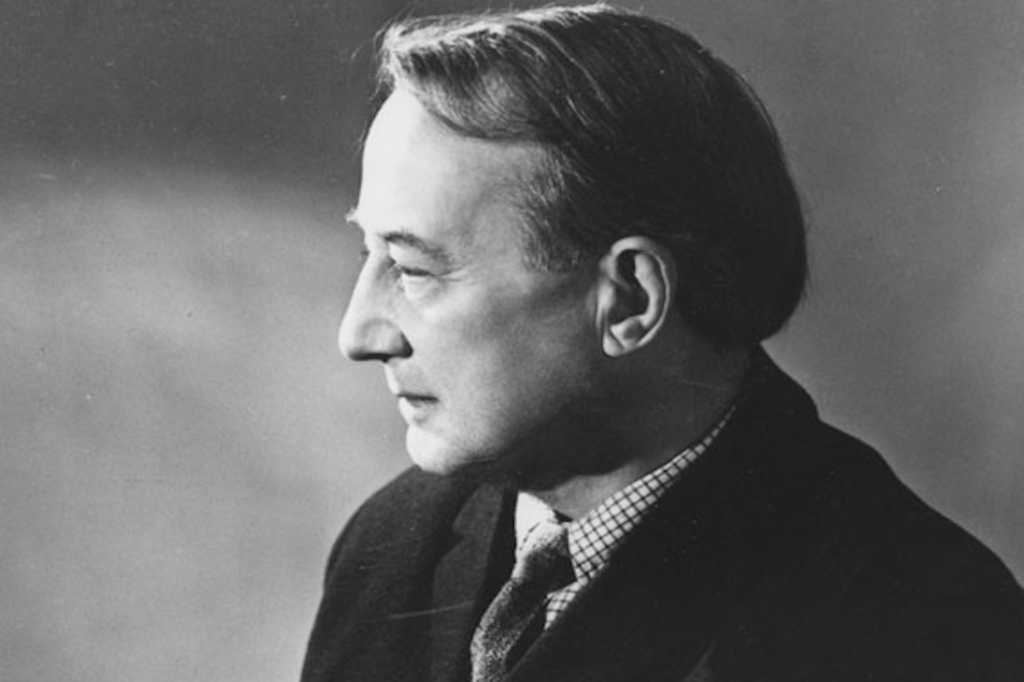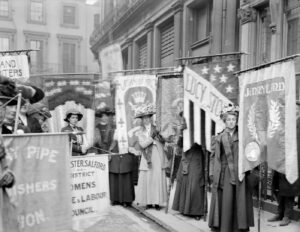This essay is part of Public Discourse’s Who’s Who series, which introduces and critically engages with important thinkers who are often referenced in political and cultural debates, but whose ideas might not be widely known or understood. The series previously considered the life and work of Antonio Gramsci and Jacques Maritain.
British political philosopher Michael Joseph Oakeshott was born in 1901 and died in 1990. Over the course of his long life, he wrote two major philosophical books and countless political and philosophical essays. Although he is usually described as a conservative, in the United States he has never fit squarely into the pantheon of influential conservative thinkers.
Part of this is his Britishness, and part of it is his refusal to be a party man. But more importantly, Oakeshott also had unconventional ideas about what is most valuable in human life: not influence, power, accomplishment or career, but the development of a personal sensibility that comes through learning. Though he often talked politics in public, he was fundamentally concerned with mortality, poetry, love, and friendship, all universal human experiences that grounded his thought about moral and political life.
Oakeshott was deeply learned and humane, and tended to see politics as an inferior—though very important—kind of activity. To put it differently, politics is “attending to the arrangements” of government, which matters very much. Yet real human fulfillment does not consist in winning political battles, or in preparing to win them, or even in the fighting. No doubt there are times for battle, as Oakeshott would have acknowledged. But he considered other social and contemplative activities far more vital to sustained human flourishing.
Because of views like these he stands outside the mainstream of most contemporary political conversations. As American politics increasingly mimics a winner-take-all competition, Oakeshott may appear less and less relevant. What is to be gained, some might wonder, in talk about a restrained, cooperative politics of civility, when we can have no hope right now of achieving this in practice?
Start your day with Public Discourse
Sign up and get our daily essays sent straight to your inbox.I suggest that it is necessary to preserve two aspects of Oakeshott’s thought in particular, regardless of whether they are current possibilities. First, his vision of an “idea” of civil politics and human freedom is among the clearest and most sophisticated expressions of classical liberalism. He articulates this vision most persuasively in his notion of civil association in his 1975 book, On Human Conduct.
Second, unlike so many contemporary political thinkers and pundits, he is keenly aware of the limits of politics, repeatedly warning against letting politics overtake all other realms of human experience. His two essays entitled “The Tower of Babel” express this idea supremely well. Oakeshott carves out a sphere of activity in which people can understand themselves not as workers or as political animals but as distinctively human beings with a variety of interests and loves.
Oakeshott is keenly aware of the limits of politics, repeatedly warning against letting politics overtake all other realms of human experience.
Modes of Knowing
Oakeshott’s 1933 book, Experience and Its Modes, was his first major work of philosophy. Following the then-dominant tradition of British Idealism, Oakeshott argued for the existence of rival ways of knowing the whole of experience. These he called the “modes” of history, science, and practice: separate apprehensions of the whole, each one differing in its considerations from all the others.
In the scientific mode, for example, a water bottle is a combination of petrochemical resins; in the mode of history it is the modern version of the Thracian drinking horn; in the practical mode it is a vessel for getting water to one’s mouth. The considerations that apply in the mode of practice (the mode that encompasses moral and political life) emphatically do not apply in the modes of science or history. In history, strictly speaking, one cannot legitimately make moral judgments; likewise, science cannot evaluate its own activity in ethical or historical terms.
Oakeshott’s theory of modality is important because it is the basis for his later identification of another mode, the aesthetic. In a 1959 essay, “The Voice of Poetry in the Conversation of Mankind,” he maintains that the aesthetic mode exists alongside the others, but that it also offers a certain kind of escape from the contingencies of life and from constant moral striving and evaluation.
In their attempts to wrest a coherent aesthetic theory from this brief essay, many commentators have found “The Voice of Poetry” puzzling or frustrating. But it is not so much a theory of aesthetics as a philosophy of life. The poetic or aesthetic voice offers an alternative and liberating way of looking at human experience as a whole. Here people are not judged but appreciated; the natural world is not exploited but enjoyed; human conduct is dramatic, not utilitarian, in character. Oakeshott has more to say about this in his later work, On Human Conduct, where he introduces the twin notions of self-disclosure and self-enactment. He does not think that we ever “escape” moral and political life, nor would we want to. Much of human meaning is found in this realm. Yet he thought that activities as “ends-in-themselves” were a vital part of human experience.
A Conservative Disposition
While Experience and its Modes had been more purely philosophical, in the late 1940s and early 1950s Oakeshott turned toward politics, embracing the essay form. His most famous work, Rationalism in Politics, is a collection of essays written during this period, first published in 1962 and subsequently republished by Liberty Fund in 1991. It represents a middle period of his output, during which he worked out what he called “dispositions” of thought and conduct. The essence of the conservative disposition he favored is a capacity to enjoy the present, to live life as it comes to us day by day, and to engage in activities that are intrinsically valuable. Reason—at least reason understood in the empirical, scientific mode of Bacon and Descartes—does not and cannot prescribe ends for activity in advance of the activity itself.
Rules and principles may well underlie good and bad conduct and public policy. But Oakeshott claimed that action “does not spring from these principles or from a knowledge of them.” Just as one need not know the rules of grammar to speak well, theoretical knowledge of a preexisting set of principles does not determine whether one acts well or badly. Grammar and principles are merely explanatory. The real spring of conduct is a traditional body of knowledge, which we have come to know by living it. Human beings, Oakeshott maintained, are deeply embedded in traditions of all kinds, and these govern our practices of politics and morality.
In terms of politics, a conservative disposition moves people not to enact, innovate, and achieve, but instead to maintain and preserve. The contribution of conservatism, Oakeshott wrote, is “to inject into the activities of already too passionate men an ingredient of moderation; to restrain, to deflate, to pacify and to reconcile; not to stoke the fires of desire, but to damp them down.”
One sees immediately how unusual this vision is in our present moment. Over the past decade in the United States, a culture of adversarial and strident conservative activism has emerged, which often appears as the mirror image of leftist activism. Oakeshott would advise us to calm down, step away from social media, and cultivate the political judgment that allows us to manage, revitalize, and govern our institutions. Politics is not supposed to be exciting.
Oakeshott would advise us to calm down, step away from social media, and cultivate the political judgment that allows us to govern our institutions. Politics is not supposed to be exciting.
A modern-day activist might object to this prescription on the grounds that when Oakeshott wrote Rationalism in Politics in 1962, the coherence of western culture was not as shattered as it is now. Despite having endured two world wars, the traditional family in the Anglo-American world of the 1950s was still more or less intact. The sexual revolution had not yet wreaked its havoc. And Christianity—if not always earnestly practiced—was less attacked or ignored than it is at present. There was, in short, a cultural foundation on which one might still retain one’s balance. All of this seems essential for the preservation of the equanimity so evident in Oakeshott’s work. Is there really a place for such an urbane, civilized conservatism in the present day, or must we fight? I shall say more about this below.
One other qualification is worth noting. While Oakeshott is certainly right that most human conduct is not self-consciously reflective, and that we usually act out of habit, there may yet be a more substantial link between reflection and conduct. For example, the reading and inward digestion of Oakeshott’s work itself tends to form people with certain tendencies. To be sure, Oakeshottians are a diverse lot—not at all homogeneous in personality or political leanings. This group includes conservative political philosophers like Timothy Fuller and the late Kenneth Minogue, but also Andrew Sullivan, famous for his advocacy of gay marriage. David Brooks regularly mentions Oakeshott in his New York Times columns. Yet as a group, readers of Oakeshott have imbibed his warnings about investing too much energy in worldly goods, and particularly in politics. They tend to be gently skeptical about the world’s scale of values, and they are attuned to the “intimations of immortality” that emerge in everyday life. Thus does philosophy influence life.
Individual Freedom
In 1975 Oakeshott published his magnum opus, On Human Conduct. This book consists of three long, related essays on the character of the moral life, the nature of political association, and the fate of politics in modern Europe. Here he explains in detail his notion of individual freedom and his crucial distinction between “civil” and “enterprise” association, which follows from a prior moral distinction concerning two kinds of human action: self-disclosure, where an agent acts in the expectation of responses from others and on the basis of established practices; and self-enactment, where a person acts on the basis of motives or “sentiments” that express who he in fact is. Self-disclosure and self-enactment are not two different moral acts, but rather two ways of looking at morality, akin to the modal theory he set out earlier in his career.
Because it does not depend on outcomes or substantive goods, self-enactment may be almost poetic in character:
This unresolved and inconclusive character of human conduct is qualified (and not merely concealed) when actions are recognized as self-enactments; that is, when they are understood in terms of the sentiments in which they are performed. There is at least the echo of an imperishable achievement when the valour of the agent and not the soon-to-vanish victory, when his loyalty and fortitude and not the evanescent defeat, are the considerations.
Based on this distinction between self-disclosure and self-enactment, Oakeshott describes the two different characters of modern European states: enterprise association and civil association. Enterprise association is, in a classic example, like a fire station. The fire station has a definite purpose, and everyone involved is clear about their rights and duties. All resources are marshalled for the extinguishing of fires; anything not aimed at this end is extraneous.
But there is another kind of association, whose purpose is not so clear. Oakeshott thinks that this civil association ought to be the model for free western nations. In civil association, there is no clear telos; rather, the essence of the association lies in its enabling free human beings to pursue their own self-chosen purposes without compulsion from the state. Government exists to facilitate the activity of self-enactment that Oakeshott finds so valuable in human life, not to direct the substance of our actions. It calls for a kind of “watery fidelity” both to the state and to the people who are one’s associates. And it also requires freedom, self-direction, energy, and responsibility in the citizens who will thrive there. Oakeshott explicitly praises individuality and blames those people who exhibit the character of the individual manqué.
Oakeshott’s Adventure
If there is an apt criticism of Oakeshott, it is that he spoke about people and politics in ways that are not altogether achievable in modern states, and that cannot be “applied” to contemporary politics. Put differently, he tended to write in terms of ideal types, which are more like essences than actual states of affairs. No pure civil association or enterprise association has ever existed in the world. For those who want strictly practical, applicable answers to pressing problems, Oakeshott is not your man. He saw his vocation as a teacher and philosopher, someone whose detachment from politics allowed him to reflect on the activity more fruitfully.
I would nevertheless argue that Oakeshott’s image-making is of great value. It resembles John Henry Newman’s “idea” of a university, which also stands as a model or image. Yet most of us understand the character of this image and do not blame Newman because he could not force his ideal university into being.
Overall, Oakeshott’s reflections on politics and human conduct provide a rich source of inspiration for western liberalism. His vision of a flourishing human life—discovering and developing individual character in the midst of traditional practices—is more aptly understood as an adventure than a duty. But it is an adventure that is constantly under threat. On Human Conduct was a rebuke to those mid-century thinkers who were trying to explain away human action in dry behavioralist or scientific terms. In our day, it stands against identity politics, which explains away human freedom in the name of race, gender, and sexual orientation. Threats to freedom and individuality will always exist, and Oakeshott’s work is permanently valuable in countering them. His work is also a delight to read—a true end in itself.











